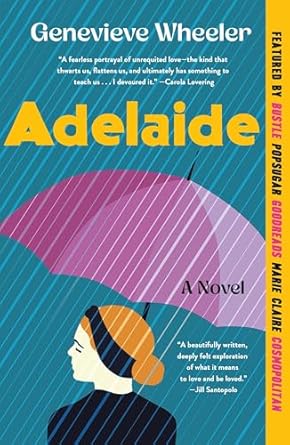More on this book
Community
Kindle Notes & Highlights
Physically, Adelaide was held together—her thighbone connected to her knee bone, and so on and so forth—but internally, mentally, she was a mess of jagged, disconnected pieces, and she didn’t believe she was capable of putting herself back together. She didn’t want to die, per se, she just wanted to stop existing. Stop being.
Books—words, really—were her favorite things, her greatest love, and the thought of working and playing with them each day was thrilling.
She was always going to jump into this lake, no matter how dark or dangerous it might turn out to be; she was too intrigued by its shimmering surface to even consider turning away. There was no world in which she wouldn’t dive headfirst in love with Rory Hughes. This was the only way.
(There were very few things about herself in which Adelaide took pride. Her gift-giving skills were among the few.)
“Everything Is Going to Be All Right,” he read, by Derek Mahon.
Because if we knew, if we honestly knew the price of love was grief, we’d never do it. We’d never succumb in the first place. And once we do—once we fall in love, against our better judgment, with something or someone—we never want to let go. No matter how many dinners they miss, how many texts they ignore. None of it matters. And none of it mattered.
(Would a small bit of Xanax help? Adelaide asked him. Oh golly, no, he said. I’m not American. I don’t just mask things with pills.)
You have to love fiercely, and unselfishly, and with intention, her mom said. It’s the only way.
He’d burned that bridge, he now knew. He was not to contact her again. Adelaide was not his anymore. Rory felt a sudden wave of nostalgia wash over him. He missed her so much now, even more than before. It’s interesting, isn’t it? How easy it is to care for something once it’s no longer ours.
It was odd—she’d had the capacity to feel joy before, to feel gratitude. Even after Nathalie’s death, the miscarriage, the breakup. But it felt like that muscle had gone limp now. Like she could flex and stretch and strain, but not fully feel a sense of positivity. She’d never experienced this before.
There was a part of her that wished she physically harmed herself. That her self-hatred might manifest itself in cuts and bruises, that she could show them to the hospital staff and say, Here. Look how hurt I am. Look at the damage I’ve done.
It was all so difficult, she felt, and Adelaide didn’t know how to explain why she wanted to decorate her flat with peonies and plants and color-coordinated stacks of books while simultaneously wanting her life to end. She wanted to be here, on this earth—to squeeze her friends’ hands on their wedding days, to kiss their babies, to send care packages to her family for their birthdays. But she also just wanted to die. To leave. If she felt more secure in her faith—safer in the knowledge that heaven existed, that she was guaranteed entry—she would have done it. She would have left. But she
...more
She wanted to be good. No, she wanted to be great—but she couldn’t be. She physically could not do it. Hell, she could hardly wash her hair, get her mail. How was she meant to become anything close to the person she wanted to be when she could barely make it outside?
Her sister Izzy had a mantra, one Adelaide had learned decades earlier: Pain is pain is pain. It was important to recognize your privilege, yes. To show gratitude, to count your blessings. But it was also important to acknowledge and accept your pain, to understand that no matter how large or small your problems, your losses, your wounds—they are yours. And you’re allowed to feel them. The hardest loss will always be your own.
the girl who felt everything—had to remind herself that it was, in fact, okay to feel. That it was okay to fill her lungs with air, her tank with fuel, her brain with the chemicals it needed. It was okay to go to hell and back, to carry every ounce of light and darkness inside of her. It was okay to love herself fiercely, a little selfishly, and with intention. It was all okay.
You forget what it feels like to have fallen apart once you’ve pieced yourself back together, what the scars feel like once they’ve healed. You know, vaguely, where they were, how the fresh cuts had stung, but you can’t run your finger over the surface anymore and say, Here. Here’s where you hurt me. The pain will eventually dull.
Sometimes, Meg would remind her, things need to fall apart before they can come together in their rightful place.
Sickness feels different when it takes place inside your head, Adelaide thought. When the illness flows through the chemicals of your mind rather than clogged sinuses or broken bones. No illness is ever really linear. But the thing is, once you’ve gotten so sick you nearly kill yourself, your mind knows where it can go. It knows that no recesses are out of bounds or off-limits.
There are parts of our hearts we give away. Not lend, but sacrifice entirely. And there are some people to whom we give these pieces, knowing we’ll never really get them back. It felt like Adelaide had been holding on, with all her might, to the chunk of her heart she’d given to Rory. No, she said. I still need it, she said. But there was no use. It was his now. It would always be his. And, with the gentle thunk by which her letter landed in the postbox, Adelaide felt like she’d finally let it go.


